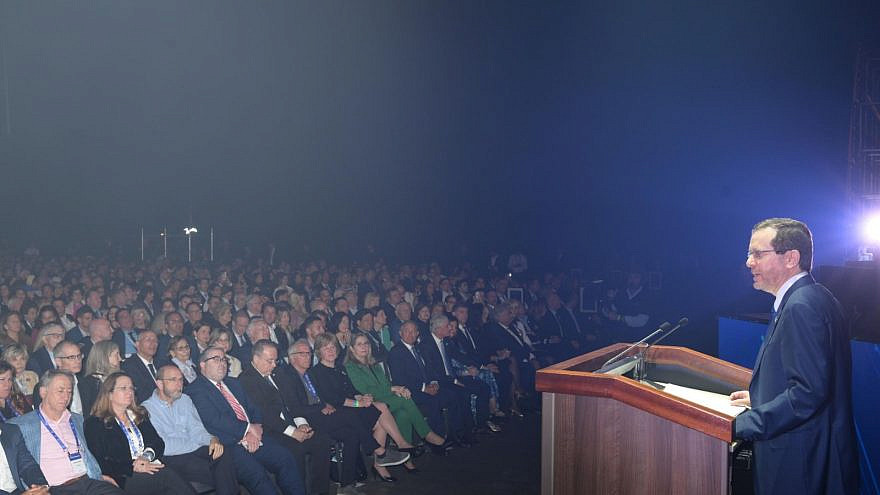Israeli President Isaac Herzog announced on Sunday night the launch of a consultation process with global Jewry, ahead of an initiative to establish a worldwide Jewish advisory council under the Office of the President.
The initiative, Kol Ha’am—Voice of the People: The President’s Initiative for Worldwide Jewish Dialogue, aims to foster open dialogue between Jewish communities and advise the Israeli president on core challenges facing the Jewish people. The advisory council, which will meet on a recurring basis, will be tasked with taking concrete action to advance collaborative projects and foster future leadership across the Jewish world.
Herzog unveiled the projects at an event held jointly by the Jewish Federations of North America, the Jewish Agency for Israel, the World Zionist Organization and Keren Hayesod in honor of Israel’s 75th Independence Day, as part of the opening ceremony of the 2023 JFNA General Assembly in Tel Aviv.
“The fact is that between our Jewish communities, and between them and the State of Israel, we are growing at times more distant from one another. The gaps between us are growing wider. On some of the most essential questions, we are unable to agree. But, more concerning, often, we are unable even to discuss,” said Herzog at the conference.
The next generation
Herzog explained that the vision of his Voice of the People program is to create “a first-of-its-kind global council for Jewish dialogue.… It will be a place where we can engage in serious, sensitive and strategic discussions on the most complex and pressing issues facing our people. A place where we formulate concrete proposals and action items to address them. But, most importantly, a place to cultivate the next generation of Jewish leaders. I consider this to be its most important function.”
The president has invited global Jewish communities to join a broad consultation process in 14 major Jewish centers, across six continents, to contribute to realizing his vision. This series of “strategic labs” will be facilitated by international consulting firm Deloitte, with the support of the Jewish Agency and the World Zionist Organization, over June and early July in the following locations: Israel, North America (New York, Miami, Chicago, Los Angeles, Mexico City, Toronto), South America (Buenos Aires, São Paolo), Africa (Johannesburg), Europe (London, Paris, Budapest) and Australia (Melbourne), and virtual labs, in Hebrew and English.
Meanwhile, Israeli Prime Minister Benjamin Netanyahu earlier Sunday canceled a scheduled address at the JFNA General Assembly, amid planned protests over the government’s paused judicial reform program.
The JFNA last week issued a statement explaining why it had decided not to boycott the prime minister as demanded by obscure and unnamed groups. “The opportunity to hear from Israel’s duly elected president and prime minister is a symbol of Israel’s achievement as a modern democratic state. We look forward to welcoming these officials on this historic occasion,” said the JFNA.
“Throughout this tumultuous period, we have engaged in close dialogue with both those opposed to the judicial legislation and those supporting it, and welcome all continued conversations. We have also been awed by the powerful statement Israel’s citizens have made exercising their democratic right to protest. Given the immense importance of this debate and its implications for Jews all around the world, we understand that some will choose to exercise that right at the General Assembly. We will do everything we can to ensure that our attendees and security professionals respect these protesters, and expect that any protestors will respect our participants by demonstrating in a way that does not disrupt their ability to attend the event, participate, or listen to the speakers,” added the organization.
Herzog expressed optimism over the weekend regarding the negotiations taking place under his auspices over the reform initiative, saying they are being held amid a “positive atmosphere.”
“There’s goodwill and there’s a positive attitude in the room, and things are discussed frankly and honestly,” Herzog told Arutz Sheva in an interview, adding that “all the hard issues [were] on the table” and the sides were attempting to reach an “amicable solution.”
“I’m definitely giving [the process] a chance. I will say, furthermore: I believe that the alternative is much worse, and all the parties concerned and their leaders know [this]. And more than that I truly believe that if we work well here, and if we work with trust, and we don’t let all sorts of forces undermine the process, we can reach a positive outcome,” the president said.


























